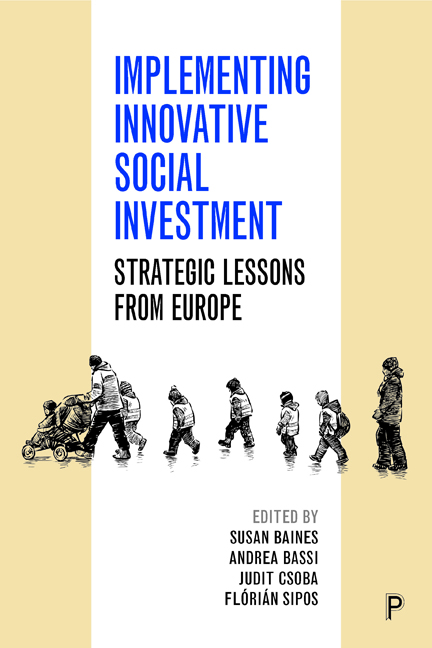Book contents
- Frontmatter
- Contents
- List of tables, figures, images and boxes
- Notes on contributors
- Acknowledgement
- one Social Investment in welfare: a sub-national perspective
- Part A Children and families: early intervention in people’s life courses
- Part B From a caring state to an investing state: labour market activation
- Part C Social solidarity and Social Investment
- Index
Part B - From a caring state to an investing state: labour market activation
Published online by Cambridge University Press: 21 April 2022
- Frontmatter
- Contents
- List of tables, figures, images and boxes
- Notes on contributors
- Acknowledgement
- one Social Investment in welfare: a sub-national perspective
- Part A Children and families: early intervention in people’s life courses
- Part B From a caring state to an investing state: labour market activation
- Part C Social solidarity and Social Investment
- Index
Summary
Discussions on Social Investment have focused strongly on employment policy and especially on active labour markets. The four chapters in this section are about new needs-based and person-centred interventions with labour market activation as a primary aim, sometimes in association with aspects of solidarity and social cohesion.
Productive social policy and the notion of the activating welfare state have become dominant topics of debates in the field of welfare during the past decades (Kluve, 2007; Bonoli, 2012; Morel et al, 2012; Nolan, 2013). Active labour market (ALM) initiatives are intended to ensure that citizens become productive and self-reliant, and they are strongly associated with the Social Investment paradigm (Bonoli, 2012; Hemerijck, 2013; Kuitto, 2016). There are many questions, critiques and debates in the literature related to the tools and effects of labour market activation (Lodemel and Trickey, 2000; Trube, 2003; Kluve, 2007; Rueda, 2007; Hemerijck and Eichhorst, 2009; Cantillion, 2011; Butterwegge, 2015). Whereas early interventions and maximising the educational attainment of children contribute to the ‘stock’ of human capital, ALMs ease its flows with varied actions to overcome barriers to employment.
The emphasis on economic returns from activating those furthest from the labour market has been a powerful argument for ‘selling’ Social Investment (Morel and Palme, 2017). As previously discussed in Chapter One, it is possible to take a more holistic view of human capital than the purely productivist version. Such a view values interventions in employment not only for economic inclusion, but also for increasing ‘human flourishing’ (Morel and Palme, 2017, citing Sen, 2001). This is consistent with the way in which Bourdieu theorised work as ‘neither an end, nor a virtue in itself ‘; in his analysis, ‘what is to be appreciated is not the activity aiming at an economic objective, but the activity itself, irrespective of its economic function’ (Bourdieu, 1978: 328).
Reflecting on the 10 case studies that feature in this book, almost all of them included some elements of ALM intervention, sometimes as a secondary focus. The four chapters in this section analyse programmes where labour market activation is a primary aim, although not necessarily the only one. Chapter Five (the Youth Guarantee, Finland) and Chapter Six (connecting vocational school graduates with the labour market in Greece) are about improving young adults’ prospects for employment and increasing their future productivity.
- Type
- Chapter
- Information
- Implementing Innovative Social InvestmentStrategic Lessons from Europe, pp. 79 - 82Publisher: Bristol University PressPrint publication year: 2019



